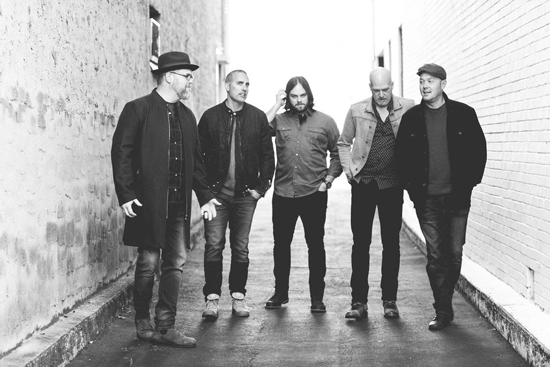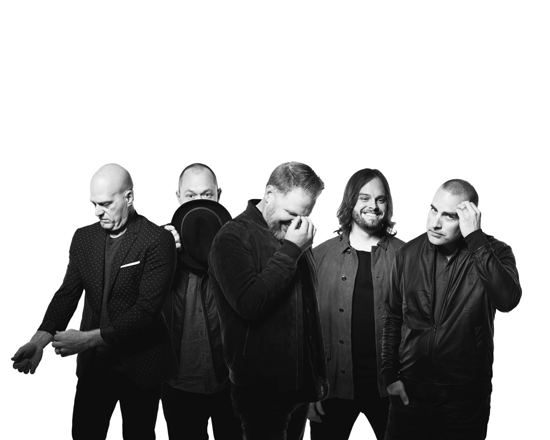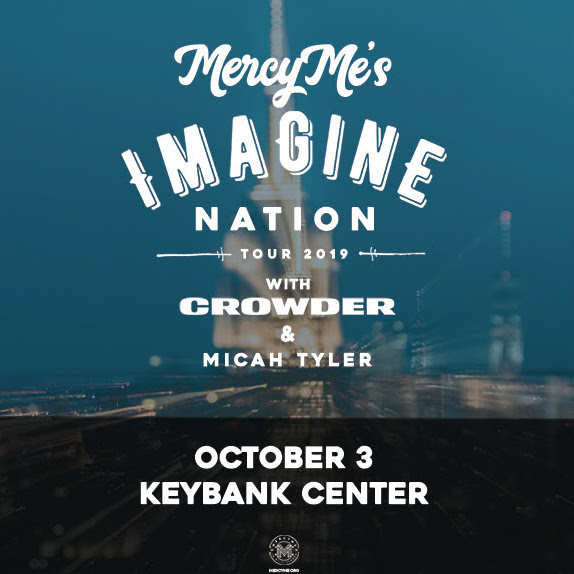Featured News - Current News - Archived News - News Categories
Singer shares advice for Jeremy Camp, who will be subject of March 2020 film
By Joshua Maloni
Managing Editor
Romans 8:28 is one of the Bible’s most well-known verses. It states, “And we know that God causes all things to work together for good to those who love God, to those who are called according to His purpose.”
Though this passage of scripture is oft-quoted in churches, in 2018 it came to life in an unexpected place: Hollywood.
MercyMe frontman Bart Millard’s life was the subject of a feature film starring Dennis Quaid. “I Can Only Imagine” is the story of Bart’s father, Arthur, changing his life and becoming a better man just before he dies of cancer.
The film grossed more than $83 million – and was inspired by a song of the same name that is RIAA-certified triple-Platinum.
Though Millard would trade his success for another day with his dad, he knows “I Can Only Imagine” has become an inspiration for millions of people around the world.
If Arthur hadn’t taken ill, would his life have changed? And if he did live, would Bart have found another tool as powerful as MercyMe’s signature song to lead others to live their best lives?
The Bible verse would suggest God took Bart’s pain and turned it into something good.
MercyMe is now taking this message on the road with its “Imagine Nation” tour. Millard, Nathan Cochran, Barry Graul, Mike Scheuchzer and Robby Shaffer will perform in Buffalo on Thursday, Oct. 3.
Though Christian musicians have drawn thousands to Six Flags Darien Lake and Artpark, this is a rare – rare – performance at KeyBank Center, home of the Buffalo Sabres.
NFP recently chatted with Millard about MercyMe’s live show, fame and fortune, and mentoring Jeremy Camp – whose life is Lionsgate’s follow-up with “I Can Only Imagine” helmers the Erwin brothers.
Like Millard, Camp can stake a claim to Romans 8:28. In his early 20s, Camp tragically lost his first wife. That heartache was the catalyst for his song “I Still Believe,” which is the title of the K.J. Apa-starring film of the same name.
An edited Q&A follows.

MercyMe (Credit: David Molnar)
Q: We’re excited about MercyMe coming to Buffalo. … I see that you guys played at Red Rocks in July. I know that's on a bucket list for many musicians. What was the experience like?
Bart Millard: It was amazing. That's exactly why we did it.
Probably a year-and-a-half ago, we were talking about venues that we just haven't had a chance to play. And Red Rocks was the one that we never did play. And so, we were like, “Hey, we want do a show there.” And so, we had a promotor that kept calling. And Red Rocks kind of blew us off. And they're like, “Nah,” you know, “We're booked up,” or whatever. And so, we kept hounding them until they were finally like, “OK.”
They gave us literally the Monday after the Fourth of July, which is like the worst – the worst time slot ever. It's all they’d give us. And then we sold it out, like, in four days, when it went on sale on Christmas. And it was like, “Oh, this is gonna be amazing.”
And Red Rocks, their tune totally changed. Like, “Hey, you can play here anytime you want.”
And when we got there, man, it did not disappoint. It's the coolest venue I have ever been a part of and played at. The weather was perfect. It's just an unbelievable place, and can't wait to go back.
Q: I don't know that a Christian band has ever played at this particular venue in Buffalo before (it has held faith-based events), but this has sort of become the norm for your band these days. Did you ever think when you first started out that you'd be playing these giant arenas around the country?
Bart Millard: I guess I could say I hoped; but, yeah, it's far exceeded my expectations.
I mean, since we wrote “Imagine” early in our career, we saw some success, to where we were opening and playing some venues and arenas, but man, we've been doing this for 25 years. I thought we'd be so done by now! (Laughs) And the fact that, when the movie came out, it just kind of blew up more than I ever thought possible – on a whole different level – it was like, man, if someone had told me that we would be the busiest and most successful 20-something years in, I would think they're crazy.
I'm just trying to avoid hard labor at all costs.
Q: Yeah, you and me both.
It's one thing when people come to Western New York and they go to Kingdom Bound. That’s a dedicated festival – and we get a lot of people for that. But, you know, when you go and play in the heart of these big cities, and you play these arenas, I'm sure you get quite a mixed group of people coming out – Christians and non-Christians and everybody in between. What is the vibe like for you guys at these arena shows?
Bart Millard: It's pretty awesome.
Just because, when you do a festival, you're one of a big lineup. And so, anybody can be there for any given artists. But to be on tour, in an arena, not many people are walking in on accident. They're there on purpose, and they want to be there. It's always more electric, you know – it's your fanbase. Even if it's new people, they’re like, “I've never seen them live, but I that's why I'm here. I didn't think there was a hockey game and accidentally walk in. I'm here to see MercyMe.”
So, the electricity is always off the charts. Versus half the crowd may be TobyMac fans and you know, who knows. Or whatever. And so that's the best part about it.
Doing shows on our own tour – versus what we call one-offs, or individual shows that are parts of a state fair or fest or whatever – I prefer that any day of the week, because it's definitely your audience. And there's nothing like it, man. It's just crazy to walk in and see a full building there to hear music you've written, or a band that you're a part of; it's really, really surreal, and it's, intoxicating, quite honestly.

MercyMe photos courtesy of The Media Collective/CMA Media Promotions
Q: For you guys, knowing you're going to have a lot of people – both non-Christian and Christian – is there a goal when you come into these arenas? Is there something you want to get out of them, in terms of faith, or do you just have the approach that, “We have these amazing songs; we wrote them for a purpose; the songs are going to do the job for us”?
Bart Millard: Yeah, it probably fits in the latter there.
We don't really have an agenda. There was probably a season when we did, and we're just kind of like … it's just not where we are.
I think the times that we’re the most impactful have been when it's like. … You know, it's funny, because the definition of evangelism is just to echo and retell the stories of what God has done, and not shove a Bible down people's throats. And so that's what the songs do. That's what we do.
Most of that stuff that we talk about, it's never going to be, “Hey, you need to do this,” or “You should do this.” We don't like “should” people, at all. It's more, “This is what God's done in my life. And this is why I wrote these songs.” Hopefully there's something desirable about that.
We don't really have an agenda. We just get up and tell stories about how, “Hey, we're wrestling through life. And sometimes we win, sometimes we lose.”
And my therapy is I write songs about most of the stuff that I go through in life; and this is kind of a product of that.
There was a time we probably were a little bit more of like, you know, “X, Y and Z needs to happen.” It's like, no, man; I just want to tell people what I've gone through, and if it resonates, awesome. If not, then I hope they had a good time regardless. (Laughs)
Q: Like you said, your band has been doing this for one or two or 25 years now. And obviously you've accumulated so many terrific songs and so many great albums. When you come to Buffalo, what will go into the setlist?
Bart Millard: Everybody has a song they want to hear; and so we do our best trying to get as many of those songs in as we can. It’s kind of a blessing and a curse is we've had a lot of success at radio. And so, just trying to get those songs out there takes up most of the show. We have to make a few sacrifices just to put in some kind of random songs that we really enjoy playing.
I think it's been a good mixture. We do a couple of songs from our older stuff, but it really leans heavily on like the last two or three records – not to mention just a bunch of the kind of staples that we have to do. We don’t change the list too much.
We stress out about the setlist in the beginning of the tour, and then we try to get locked in. And then every once in a while we'll switch it.
But there's so many components that go in, whether it’s the LED and video and all this kind of stuff. I wish there was more room to kind of shut it off and kind of improvise as we go. But it's such a fine-tuned machine now.
We're starting to work towards, like, “Hey, can we cut the cord a little bit, and have a little room to breathe, and make up stuff as we go?” And so, we're getting there. I say we're kind of regressing back to the simpler days, a little bit. So, there's a set in here – an acoustic set – where it's kind of us winging it a little bit; and that ends up as my favorite part of the night.
Q: You mentioned the movie. I spoke to Jeremy Camp right before they were going to announce a movie was coming out about his life. And the first thing I asked him was whether or not he had spoken to you.
What sort of guidance did you give to him, as far as how your life is going to change when you're the subject of a major motion picture?
Bart Millard: Man, we’ve talked a few times. I saw the movie for the first time last night, the first cut, and it's amazing. It's heavy, but it's amazing. They did such a great job. I just talked to Jeremy this morning, telling him that I finally saw it, and I hope he’s happy with it. And I think he is. But, man, I just told him, I said just make sure you know to say “No” to stuff, because you're going to get pulled in a billion directions.
The movie world is such a sprint. If we release an album, we have a good 18 months to two years of promoting one single, the next single, whatever. This movie, if you're lucky, is in the box office maybe six weeks; maybe nine weeks, if you're lucky. And then it's done. And then it goes to home entertainment and stuff, and it kind of runs on its own then.
But you promote hard and heavy for a short term, then it’s all of a sudden there's this kind of, like, depression you go into after it's done. It's weird. And so, I said just be prepared for that. And once the heavy lifting is done, man, step away and take a break and regroup, because you still have a career in music on top of that. The two combined could be overwhelming; and you’ve just got to pace yourself, and enjoy it.
Even if the movie was an awful flop, it's still – the impact that a movie has, on the brand, is like nothing I've ever seen. Like, even if it was an average movie, it's like the attendants, the people that are just looking in your direction and your ministry, is overwhelming.
And so, just get used to it. And just learn to say “No.” You don’t have to do everything. This is not the beginning of your career nor the end. So just enjoy the season, but keep pacing yourself.
Q: Your movie made $80 million, which is incredible. And you were already the frontman of a band that was named Christian Band of the Decade. So, it's not like you were some obscure artist somewhere. But when this movie came out, I mean, you were legitimately a famous, well-known celebrity in all realms of entertainment and pop culture.
Like you said, there's a lot of promoting; there's a lot of weird things that come with movies; there's a lot of heavy lifting and whatnot. But how do you sort of wrap your brain around that level of fame and notoriety?
Bart Millard: I don't know if I was really aware of (the movie’s success). I knew the numbers, (but) luckily I wasn't aware of the reach that it had.
I think the first time it kind of freaked me out was when it was either “Jeopardy!” or somewhere; it was a question in a game show of like, “The movie is about who?” or something like that. (And) in a crossword puzzle in The New York Times; something like that.
A few times those things have popped up, and it really freaked me out – like, “What's happening?” Because, we were really good at kind of staying in our world, and with surrounding ourselves with our people, and just kind of keep trying to keep the same pace, if you will.
And so, every once in a while somebody would send me something like that, or a clip of it. And I'm like, “What is happening!?!”
I think, because “Imagine” kind of blew up in the whole mainstream thing years ago, that was a little bit scary and different for us enough to where we're like, “Hey, man, we don't know what's about to happen, but if it's anything like this, then we need to kind of batten down the hatches,” and all this kind of stuff.
And so, even though it was 10 times more than we ever thought possible, we at least tried to kind of secure things spiritually and emotionally, and just keep ourselves close together, and go through it. So, it wasn't that bad, at all.
We, about five years ago, decided (to) cut all of our shows in half and only do about 65 to 70 shows a year. And even through all this, we stuck with that. We may have done bigger shows, but we still did about 70 shows a year. And just got really selective on, “Is this something we need to do? Is it worth it?” And just having management that would really play the heavy and make sure we stayed on course helped a ton.
And so, it wasn't that bad. It was crazy to watch and hear the things that were going on. But as far as the direct impact on us … it wasn't too bad.
I got five kids, so I just kind of stay busy with them mostly.
Q: They’ll keep you grounded, I bet.
Bart Millard: Totally.
Q: Hollywood, obviously, sees the Christian market as sort of an untapped area, and they’re doing more of these movies. A lot of that is probably based on the financial success they perceive it can have. But Christianity and Hollywood are not things that necessarily go hand in hand, or that people associate as going hand in hand.
Dollars and cents notwithstanding, what was your impression of that world? Do you find there are actually people of faith in Hollywood – maybe looking to do more creative things like “I Can Only Imagine”?
Bart Millard: There are definitely believers that are within the industry. There's not many of them.
For the industry, it comes down to, “What can we make that makes money?” – that's all it comes down to. You know, you may have one or two here or there that are like, “Hey, man, I'm cheering this thing on, because I'm a believer, and it's amazing,” but they're few and far between.
But, you know, on the flip side of that, I've always been one to say, “Hey, man, you know, even if it's the worst movie ever, try to support these movies,” because if it makes money, then the people that are at the helm are willing to make more of them. Which means that they're only going to get better, and that the gospel gets out there in cool, different ways.
And so, it's like the worst place to be competitive, but yet be on the same team, as far as faith-based movies and stuff. Because the more you do it, the better you get at it. And right now, they're hotter than ever.
Kind of a similar search happened after “The Passion of the Christ,” where they'll literally say, “We want to cash in on the ‘red states.’ ” That’s what they'll say in Hollywood. They don't care what it's about. They just want to know does it tap into your fanbase? Does it tap into this world?
In fact, what's cool about it – because they don't really care or know much about it – all of a sudden you get a little more say, and they kind of leave more of it in your hands, thinking that we do know better.
I've gotten involved on the TV and movie side, since “Imagine” came out, and been able to kind of watch and develop things and help with ideas. And it's been amazing how supportive they are, because they don't know where to even start, without messing it up. So they feel like, as far as the faith-based world, they’re like, “Hey, man, if you’ve got an idea, we’ll back it up – if you think it's gonna work.”
So that's been the cool part, is that they’ll admit that, “We don't know anything about it. We just like that it sells.”
I kind of put it under the category of Christ redeeming all things; is that it's an opportunity that we shouldn't have. But we're getting to kind of play in that platform, which blows my mind. And who knows? Some lives on the higher ranks may get changed along the way. But overall, they’re just like, “If it makes money, do it.”
So, as long as we keep supporting these things, you'll keep seeing more, hopefully.
MercyMe performs at Buffalo’s KeyBank Center at 7 p.m. Thursday, Oct. 3. Click HERE for tickets.
The band is online at http://mercyme.org/.































